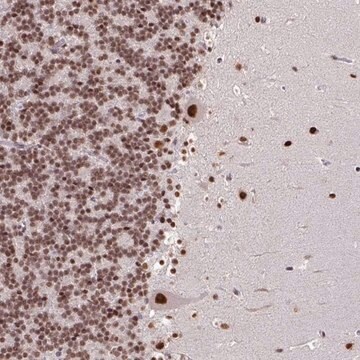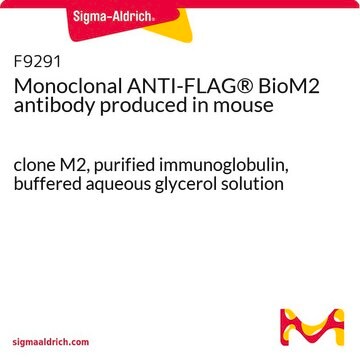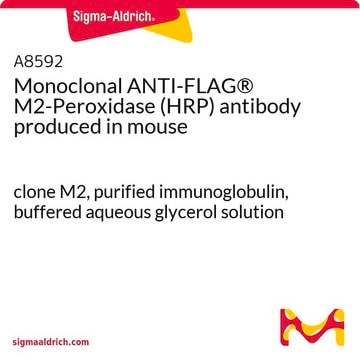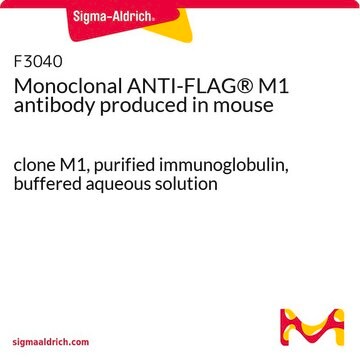추천 제품
일반 설명
G/T mismatch-specific thymine DNA glycosylase (EC 3.2.2.29; UniProt Q13569; also known as hTDG, Thymine-DNA glycosylase) is encoded by the TDG gene (Gene ID 6996) in human. Base excision repair (BER) is initiated by damage-specific DNA glycosylases that recognize and remove aberrant bases by hydrolyzing the N-glycosidic bond, creating an apurinic/apyrimidinic (AP) site. This is followed by an (AP)-endonuclease-catalyzed DNA strand incision 5′ to the AP site, trimming of the 5′ end by an (AP)-lyase or an endonuclease, DNA resynthesis by a DNA polymerase and strand sealing by a DNA ligase. Monofunctional glycosylases have only glycosylase activity, whereas bifunctional glycosylases possess additional AP lyase activity and can therefore convert a base lesion into a single-strand break without the need for a separate AP endonuclease. TDG is a monofunctional DNA glycosylase that excises thymine and uracil from G·T and G·U mismatched oligonucleotide substrates as well as the highly mutagenic adduct 3,N4-ethenocytosine from double-stranded DNA. TDG DNA-binding affinity is regulated by SUMOylation, which dramatically reduces its affinity toward DNA substrate and AP site. Sumoylation also potentiates the stimulatory effect of (AP)-endonuclease (APE1/HAP1) on TDG.
면역원
Epitope: N-terminal
KLH-conjugated linear peptide corresponding to a sequence from the N-terminal region of human Thymine-DNA Glycosylase.
애플리케이션
Anti-Thymine-DNA Glycosylase Antibody is an antibody against Thymine-DNA Glycosylase for use in Western Blotting, Immunocytochemistry.
Immunocytochemistry Analysis: 2.5 µg/mL from a representative lot detected Thymine-DNA Glycosylase in A431, HeLa, HUVEC, and NIH/3T3 cells.
Research Category
Epigenetics & Nuclear Function
Epigenetics & Nuclear Function
Research Sub Category
Cell Cycle, DNA Replication & Repair
Cell Cycle, DNA Replication & Repair
품질
Evaluated by Western Blotting in HeLa nuclear extract.
Western Blotting Analysis: A 1:5,000 dilution of this antibody detected Thymine-DNA Glycosylase in 10 µg of HeLa nuclear extract.
Western Blotting Analysis: A 1:5,000 dilution of this antibody detected Thymine-DNA Glycosylase in 10 µg of HeLa nuclear extract.
표적 설명
~55 kDa observed. 46.05 kDa calculated. 55–60 kDa unmodified and 81-86 kDa posttranslationally modified forms reported (Hardeland, U., et al. (2002). EMBO J. 21(6): 1456-1464). Uncharacterized band(s) may appear in some lysates.
물리적 형태
Affinity purified
Purified rabbit polyclonal antibody in buffer containing 0.1 M Tris-Glycine (pH 7.4), 150 mM NaCl with 0.05% sodium azide.
저장 및 안정성
Stable for 1 year at 2-8°C from date of receipt.
기타 정보
Concentration: Please refer to lot specific datasheet.
면책조항
Unless otherwise stated in our catalog or other company documentation accompanying the product(s), our products are intended for research use only and are not to be used for any other purpose, which includes but is not limited to, unauthorized commercial uses, in vitro diagnostic uses, ex vivo or in vivo therapeutic uses or any type of consumption or application to humans or animals.
Not finding the right product?
Try our 제품 선택기 도구.
Storage Class Code
12 - Non Combustible Liquids
WGK
WGK 1
Flash Point (°F)
Not applicable
Flash Point (°C)
Not applicable
시험 성적서(COA)
제품의 로트/배치 번호를 입력하여 시험 성적서(COA)을 검색하십시오. 로트 및 배치 번호는 제품 라벨에 있는 ‘로트’ 또는 ‘배치’라는 용어 뒤에서 찾을 수 있습니다.
Jia-Bao Yan et al.
Molecular therapy oncolytics, 18, 282-294 (2020-07-31)
Type 2 diabetes mellitus (T2DM) is a frequent comorbidity of cancer. Hyperinsulinemia secondary to T2DM promotes cancer progression, whereas antidiabetic agents, such as metformin, have anticancer effects. However, the detailed mechanism for insulin and metformin-regulated cancer cell proliferation remains unclear.
자사의 과학자팀은 생명 과학, 재료 과학, 화학 합성, 크로마토그래피, 분석 및 기타 많은 영역을 포함한 모든 과학 분야에 경험이 있습니다..
고객지원팀으로 연락바랍니다.







